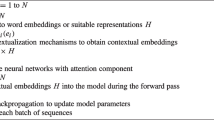Abstract
Suicide ideation detection on social media is a challenging problem due to its implicitness. In this paper, we present an approach to detect suicide ideation on social media based on a BERT-LSTM model with Adversarial and Multi-task learning (BLAM). More specifically, BLAM combines BERT model with Bi-LSTM model to extract deeper and richer features. Furthermore, emotion classification is utilized as an auxiliary task to perform multi-task learning, which enriches the extracted features with emotion information that enhances the identification of suicide. In addition, BLAM generates adversarial noise by adversarial learning improving the generalization ability of the model. Extensive experiments conducted on our collected Suicide Ideation Detection (SID) dataset demonstrate the competitive superiority of BLAM compared with the state-of-the-art methods.
Access this chapter
Tax calculation will be finalised at checkout
Purchases are for personal use only
Similar content being viewed by others
Notes
References
Ambalavan, A.K., Moulahi, B., Azé, J., Bringay, S.: Unveiling online suicide behavior: what can we learn about mental health from suicide survivors of reddit? In: MedInfo, pp. 50–54 (2019)
Cao, L., Zhang, H., Feng, L.: Building and using personal knowledge graph to improve suicidal ideation detection on social media. IEEE Trans. Multimedia (2020)
Gunn, J.F., Lester, D.: Twitter postings and suicide: an analysis of the postings of a fatal suicide in the 24 h prior to death. Suicidologi 17(3), 28–30 (2012)
Kim, Y.: Convolutional neural networks for sentence classification. In: Moschitti, A., Pang, B., Daelemans, W. (eds.) EMNLP 2014, pp. 1746–1751. Association for Computational Linguistics (2014)
Liang, Y., Guo, B., Yu, Z., Zheng, X., Wang, Z., Tang, L.: A multi-view attention-based deep learning system for online deviant content detection. World Wide Web 24(1), 205–228 (2021). https://doi.org/10.1007/s11280-020-00840-9
Miyato, T., Dai, A.M., Goodfellow, I.J.: Adversarial training methods for semi-supervised text classification. In: ICLR 2017 (2017). OpenReview.net
Sawhney, R., Joshi, H., Gandhi, S., Shah, R.: A time-aware transformer based model for suicide ideation detection on social media. In: Proceedings of the 2020 Conference on Empirical Methods in Natural Language Processing (EMNLP), pp. 7685–7697 (2020)
Sawhney, R., Joshi, H., Gandhi, S., Shah, R.R.: Towards ordinal suicide ideation detection on social media. In: Proceedings of the 14th ACM International Conference on Web Search and Data Mining, pp. 22–30 (2021)
Sinha, P.P., Mishra, R., Sawhney, R., Mahata, D., Shah, R.R., Liu, H.: Suicidal-a multipronged approach to identify and explore suicidal ideation in twitter. In: CIKM 2019, pp. 941–950 (2019)
Zhang, X., Zhao, J.J., LeCun, Y.: Character-level convolutional networks for text classification. In: Cortes, C., Lawrence, N.D., Lee, D.D., Sugiyama, M., Garnett, R. (eds.) NIPS 2015, pp. 649–657 (2015)
Zhang, Y., Wang, L., Zhu, J.J., Wang, X.: Conspiracy vs science: a large-scale analysis of online discussion cascades. World Wide Web 24(2), 585–606 (2021). https://doi.org/10.1007/s11280-021-00862-x
Acknowledgements
The research described in this paper has been supported by the Hong Kong Research Grants Council through a Collaborative Research Fund (project no. C1031-18G) and Shenzhen Philosophy and Social Sciences Fund in the 13th Five-year Plan (project no. SZ2018B020), P. R. China.
Author information
Authors and Affiliations
Corresponding author
Editor information
Editors and Affiliations
Rights and permissions
Copyright information
© 2021 Springer Nature Switzerland AG
About this paper
Cite this paper
Li, J. et al. (2021). Suicide Ideation Detection on Social Media During COVID-19 via Adversarial and Multi-task Learning. In: U, L.H., Spaniol, M., Sakurai, Y., Chen, J. (eds) Web and Big Data. APWeb-WAIM 2021. Lecture Notes in Computer Science(), vol 12858. Springer, Cham. https://doi.org/10.1007/978-3-030-85896-4_12
Download citation
DOI: https://doi.org/10.1007/978-3-030-85896-4_12
Published:
Publisher Name: Springer, Cham
Print ISBN: 978-3-030-85895-7
Online ISBN: 978-3-030-85896-4
eBook Packages: Computer ScienceComputer Science (R0)




